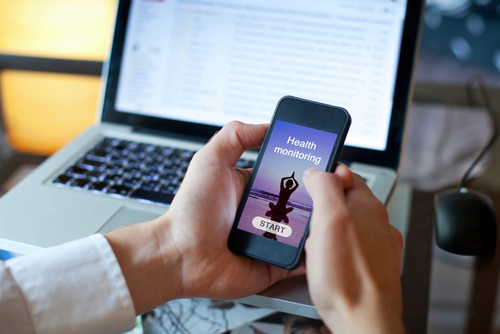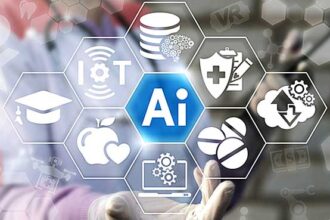In today’s high-tech world, a major role is played by technology in every field as well as in our personal lives. Among industries, technology is playing an important role in the healthcare industry. This merger of technology and healthcare is contributing to healthcare app development, further resulting in improving as well as saving many lives around the world.
Technology merged with medical science turns into a broad innovative field giving room for sustainable health. Areas related to medical science including biotechnology, pharmacy, information technology, development of various medical devices as well as equipment have contributed a lot to the healthcare industry all over the globe. From comparatively smaller innovations such as adhesive bandages and ankle braces, to large and complex technologies such as MRI machines, robotic prosthetic limbs, and artificial organs, technology has left a great impact on medical and health care industry.
In the medical and healthcare industry, there is great dependence on technology due to which the number of innovations in healthcare app development can be seen. These apps help in better diagnosis, efficient surgical procedures, and overall improved health care.
A lot of contribution has been made by information technology in the healthcare industry. There has been a great usage of electronic medical records (EMR), mobile technologies such as tablets and smartphones, by which both the physicians as well as patients have experienced benefits.
Medical technology has evolved from introducing doctors to new equipment to use inside private practices and hospitals to connecting patients and doctors thousands of miles away through telecommunications. It is not uncommon in today’s world for patients to hold video conferences with physicians to save time and money normally spent on traveling to another geographic location or send health information instantaneously to any specialist or doctor in the world.
With more and more hospitals and practices using medical technology like mobile devices on the job, physicians can now have access to any type of information they need – from drug information, research and studies, patient history or records, and more – within mere seconds. And, with the ability to effortlessly carry these mobile devices around with them throughout the day, they are never far from the information they need. Applications that aid in identifying potential health threats and examining digital information like x-rays and CT scans also contribute to the benefits that information technology brings to medicine.
Because of websites and mobile apps, healthcare and the medical industry has seen an online phase. With the help of Internet, technology has showed its importance in healthcare, medical, medicine as well as lifestyle domains. There are various apps which target mainly the mobile devices like tablets and smartphones, thus lying a strong foundation to healthcare app development. Healthcare apps, whether they target mobile or web, can be easily used as a reference database, technique module, medical calculator, and a clinical checkup tool.
Most of these are health and fitness apps, which enable the tracking of health parameters by users and provide users with interesting insight about their fitness level. This is certainly the best time to develop a mobile health app. Below are some of the features that make healthcare apps so powerful.
- Target hardware
As a healthcare app developer, one would target generally more than one platform including desktop and mobile devices like tablets and smartphones. The way the smartphone users interact with a particular app is different from the other user interacting with the same app which depends on the speed of information to length.
There are various enterprise healthcare mobility solutions which are capable to be operated and optimized on tablet. This can result in more functionality of the app as compared to the functionality on a smartphone. A patient engagement solution app can be optimized on tablet whereas ‘call a doctor’ app can be optimized on smartphone. Though most apps are developed to be operated on smartphones, they can also work on tablets seamlessly.
- Interoperability
One of the important factors while developing the healthcare mobility solutions is the interoperability of the apps with the traditional clinical management system that is used by the hospital staff. These days, various enterprise healthcare mobility solutions including the medical scheduling software help in facilitating interoperability.
Though the technology has developed a lot, hospitals still rely on the traditional hosting, including the standalone software installation to cope up with the high cost of cloud hosting. In these cases, the developer needs to build a compatibility layer of the app.
- API components
API or Application programming interface, as the name suggests, is a tool, process, or routine which executes a particular task or interacts with the software or a part of the software. Social networking apps as well as various advertisers depend on APIs to pass on the particular information. When a user login into an app, the whole authentication process is supported by an API request for connecting the user’s device to a remote server.
In the case of the patient engagement solutions, the healthcare app development operators have to add API components so as to authenticate the user’s device to access the repository of the patients. Moreover, the developer needs to add other APIs from suppliers as well as vendors.
- Data security
These days, the app developers avoid to store the app data in the mobile device for security reasons. If the traditional clinical management system app connects to a limited number of simultaneous API requests, the developer can store the app data on the server.
App servers are built for speed, not security and thus, are not difficult to breach into. developers must encrypt data they save on their servers. Moreover, the transfer of data between the device and the secure remote server is open to communication interception by government agencies, and fraudulent organizations and individuals.
Thus, if security is paramount as in the case of healthcare apps, developers must insist on end-2-end encryption or send data over secure communication channels only.
- Device security
Arxan, a data security company suggests Android apps are lesser secure than iOS apps are. In fact, in apps where security matter more than anything else, many cybersecurity advocates are against the idea of developing an app for Android, at all.
Android constitute more than 80% of smartphone market today. Smartphone manufacturers are stepping in to fill the security holes left by Android with their own homegrown solutions.
Samsung knox is one such example that allows seclusion of work activities from personal activities. this is a great step ahead considering most organizations these days have bring your own device (BYOD) policy in place.
Blackberry is also trying hard to bring the same level of security its devices were once famous for. Moreover, our developers suggest there are certain lines of code you can add to make your apps safer.
However, not much will change until Google steps in and sort the security issue on its famous mobile OS, once for all.
There is a certain number of features that every daily-life app needs to have:
- Sleep (amount and phases)/run/steps tracker, depending on the goal you pursue with your product. Optional tracker features could also include heart rate/blood pressure/pulse, liquid consumption and incline swings (essential to calculate steps or kilometers ran properly). More complex and more optional would also be calorie counter, for those who really want to keep fit.
- Based on data collected from user’s activity, app should be capable of measuring metrics and making certain conclusions.
- Push-notifications, that would encourage users to act formed on the data application receives
Applications of this type are commonly monetized with a prepaid subscription for a service. For instance, Headspace app has a monthly or yearly subscription, and so do many. You can also monetize your application with a help of advertisement, but it may result in lower user retention.
Why does your mobile app fail and how to fix it”, there may be a few grounds for it:
Poor User Experience.
There are many signs of the inappropriate user experience. Usability Geek has even listed 10 most common of them. It is important to realize here that the shelves of mobile app market are already stocked with “ghost house apps” that nobody uses. At least avoiding things like inappropriate content, complex user flow and not so obvious CTAs can make a huge audience part stay with your product.
Lack of Expertise & Industry Knowledge.
One of the most crucial keys for healthcare app success is the expertise it provides for you – if there is not enough of “doctor’s input”, people are unlikely to stick to it.
No Particular Problem Solved
The major issue which most of the healthcare apps face is that they are unable to serve a particular purpose more specifically. With their product, they try to cater to all the needs, serving none in return.
Final Thoughts
All the medical or health related mobile apps need to abide by the rules and regulations of HIPAA. This is the major factor where many healthcare app development companies fail. That said, healthcare apps can be a wonderful step forward for the industry and patient care, in all kinds of powerful ways. If we continue to refine the apps and improve them, we’ll be on the way to a wonderful step forward in healthcare.








_7-250x220.jpg)
